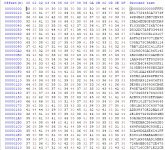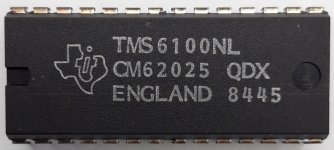Chr$
Experienced Member
Just noticed there is a BBC section here. It doesn't look all that busy but I'll give it a try before asking elsewhere!
The BBC Model B has by default, 2 empty sockets for TMS speech chips. One of the spaces is for a TMS5220, which is the speech processor. The other is the so-called Phrase ROM, a TMS6110 chip. The Phrase ROM contains (obviously) the phrases that get processed to ultimately emanate from the loudspeaker. Other contemporary devices used the same pair of chips to generate speech.
I am attempting to read and save (to file) the contents of a TM6100 Phrase ROM chip using a BBC Model B.
I'm using the ReadPHROM program on this page:
The content appears on screen but I am not familiar with the BBC and have no idea how to save the data that scrolls past to a file. I expect (hope) it's something obvious that BBC users know about.
Thanks.
The BBC Model B has by default, 2 empty sockets for TMS speech chips. One of the spaces is for a TMS5220, which is the speech processor. The other is the so-called Phrase ROM, a TMS6110 chip. The Phrase ROM contains (obviously) the phrases that get processed to ultimately emanate from the loudspeaker. Other contemporary devices used the same pair of chips to generate speech.
I am attempting to read and save (to file) the contents of a TM6100 Phrase ROM chip using a BBC Model B.
I'm using the ReadPHROM program on this page:
The content appears on screen but I am not familiar with the BBC and have no idea how to save the data that scrolls past to a file. I expect (hope) it's something obvious that BBC users know about.
Thanks.


